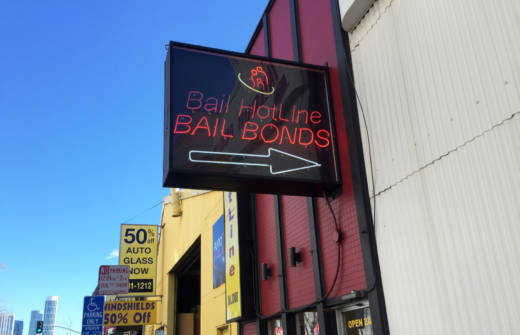Gonzalez Rogers found in March, as other courts have, that reliance on cash bail creates an unconstitutional inequality between affluent and poor arrestees. Those who can afford to pay hundreds or thousands of dollars to guarantee they’ll show up in court are released within 12 hours on average in San Francisco, according to court filings, but those who can’t afford to pay may end up waiting in jail for several days before a judge decides whether they can be released pending trial.
The lawsuit initiating the case was brought in late 2015 by two women arrested separately in San Francisco.
Riana Buffin spent almost two full days in jail on a charge of grand theft because she couldn’t afford bail and lost her $10.25 an hour job at Oakland’s airport as a result. Crystal Patterson was jailed for more than 24 hours on charges of assault, then promised to pay $15,000 plus interest to a bail agent so she could be released. Prosecutors dropped charges against both women.
Their attorneys are asking Gonzalez Rogers to keep the option to pay bail in place and order San Francisco to create alternatives for arrestees who can’t afford to pay that would still result in release within 12 hours.
“We’re saying it can be speedy. The Superior Court said it can be speedy. Make it speedy,” plaintiffs’ attorney Sadik Huseny argued Friday.
Gonzalez Rogers said San Francisco Superior Court had “stuck its head in the sand” on the issue. Huseny said the local court “torpedoed” a plan to replace cash bail that the sheriff had tentatively agreed to. He declined to elaborate after the hearing on that now-abandoned proposal, which was part of confidential settlement negotiations.
While San Francisco opposes the plaintiffs’ plan to keep the option for bail and ensure that pretrial release decisions are made within 12 hours of booking, an attorney representing the city and sheriff said there is still the potential for a compromise. The parties were ordered to another settlement conference on Wednesday.
Original post, 6:30 a.m. Friday: Five months after a federal judge ruled that San Francisco’s bail system deprives low-income defendants of their constitutional right to freedom before appearing in court, the same judge is expected to rule Friday on how the city should replace prearraignment cash bail.
The federal case is one of several legal and political challenges to California’s cash bail system, which often requires defendants to pay bail agents hundreds or thousands of dollars to secure their release before an early court appearance at which they are formally charged, called an arraignment, or pending trial. The debate pits public safety concerns over defendants who could flee or commit more crimes against the presumption of innocence until proven guilty.
State legislation to eliminate bail entirely — and replace it with a system that gives judges far more discretion — was signed last year by then-Gov. Jerry Brown but hasn’t yet taken effect. That’s because the bail industry collected enough signatures to place a referendum on the November 2020 ballot, asking voters to overturn the law.
The case in court Friday was brought by two women who were arrested in San Francisco but couldn’t afford to post bail before their arraignment and had to stay in jail for more than 24 hours. The suit challenged the city’s pre-arraignment bail system, arguing that it discriminated against poor people because they ended up staying in jail longer than people who could immediately pay to be released.
In a March ruling, Oakland-based federal Judge Yvonne Gonzalez Rogers agreed, writing that plaintiff Riana Buffin spent 46 hours in jail and lost her job because she couldn’t afford bail; and plaintiff Crystal Patterson spent 29 hours in jail and had to promise to pay $15,000 to a bail agent to secure her release.
Rogers wrote that people arrested in San Francisco who are able to post bail get out of jail more quickly than people who cannot, that the sheriff’s use of bail “significantly deprives plaintiffs of their fundamental right to liberty,” and that alternatives exist that will still protect public safety and ensure that offenders show up in court.
But she didn’t rule then on what the city should do to replace cash bail. Instead, she asked the parties to brief her on what they believe San Francisco should do.
There’s not a lot of agreement.
